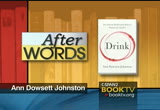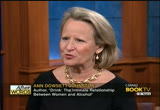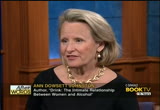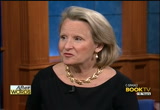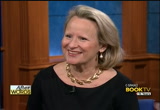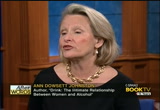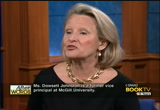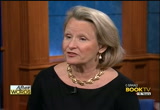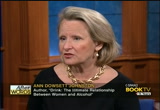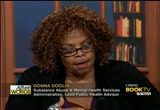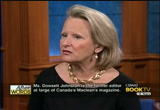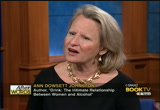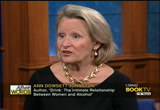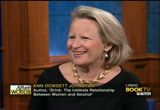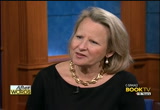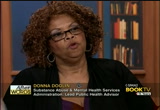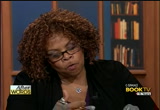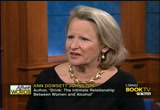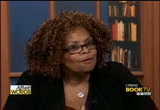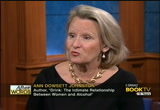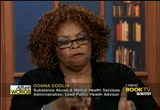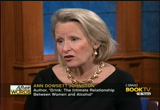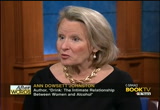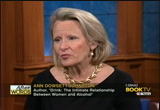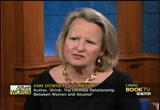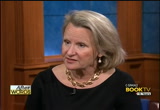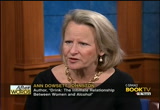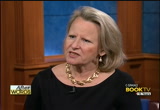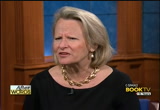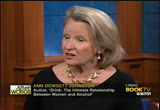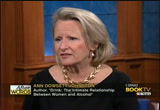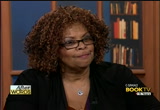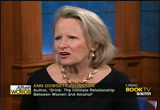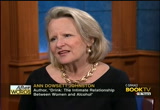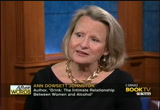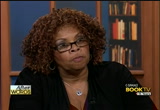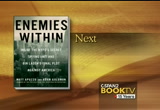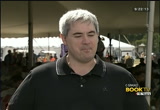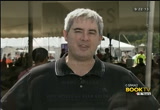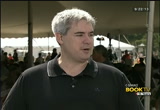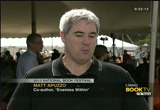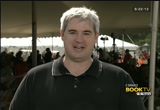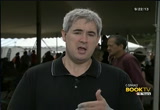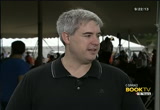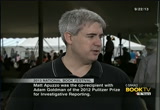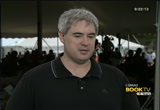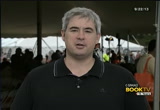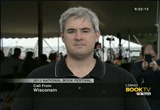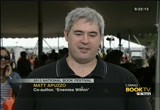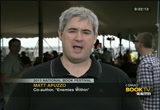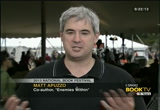tv After Words CSPAN October 28, 2013 12:00am-1:01am EDT
12:00 am
to more than 20,000 a year in the u.s. alone. the program is about one hour. >> host: hello, ann. how are you? i'm excited to have this opportunity to visit with you about this new book called "drink." it's dirty intriguing and provocative and like i say, it reminded me of when i was working in treatments about the relationships of alcohol and women and i guess one of the questions that i wanted to ask you is why now? ..
12:01 am
12:02 am
and the '70s depending on mother's little helper. a stay at home mom and a poster girl for that era. i have always been interested why she dropped and i said i never would but in my fifties i had a bad patch in my own life and i would say a poster girl for this era. well-educated, highly professional, the other, and not drink two or 34 glasses of wine per night the five or six and i caught myself quickly and went to rehab. >> can you talk about that with the addiction? >> i was full of shame.
12:03 am
i was deeply humiliated by my a behavior. but i did blackout. right before i went to sleep. i said i would get a handle on it. of favorite cousin was killed by a drunk driver. i will just quit and i couldn't. i knew i was addicted. it was confounding. so i thought it could not be the alcohol. >> host: just like the year on the wall imi the other after all. do you think what you
12:04 am
experienced was pretty experience -- common with other women? >> guest: i know the behavior coming the extreme behavior i was involved in was the far end of the spectrum that i became addicted. the larger group are not it is only 2.5 percent of those better actually alcoholic. but a lot of women have risky behavior, the binge drinking cdc warned about the fact that this was of epidemic proportions. and that is what we don't focus on the focus on the alcoholic but now for the common person behavior it is only ninth drinks per week that is not a lot but never more than two on one occasion.
12:05 am
people would find that is something he could not manage. >> host: what about four young girls? are they in the same range? if you look at the age differences? to find the difficulty. >> the young one has been targeted we saw these sweet in fused prepackaged drinks fed is transitional to get people interested in drinking because you -- a women don't like the taste of beer because they match your a -- richer into vodka drinkers on campuses you have young men and young
12:06 am
women drinking games but the men were with your but the women playing with vodka or shots. that is risky behavior we no alcohol is the number one date rape drug so we see a very different behavior on the part of this generation does not treat can drive but they pre-drink before a bar because it is expensive to have alcohol in the dorm and drink a head of the event that means once they get there there already inebriated. very risky behavior. >> host: that also puts an added risk for what other types of behavior? >> many others. you can see high-profile accidents certainly sexual behavior that isn't wanted
12:07 am
absolutely a broad spectrum of absence -- accidents but young women used to slow down after university college they would slow down but they're not doing that now. >> host: why do you think that is? >> women are getting a complex message in the middle of a sociological revolution in that their children have to be great mothers, they have to be thin, a good-looking, a managing house well and a sense of entitlement i can do everything a young man does that includes a glass of wine after work to wind down and when you tend to medicate depression and anxiety and loneliness there is a lot of anxiety with how do i manage it all?
12:08 am
the professional woman i the think this is let gloria steinem had in mind. >> host: so the expectations that battle of the society puts on women but what how that plays a role? >> guest: right. i wonder if it is the modern bowmans to ride a drink to stay away, relax, the i used alcohol. i think if you are rewarding yourself but to them yourself is not a great idea >> host: as i was reading through "drink" one of the things that came to mind for me were there times he found yourself hesitating to put
12:09 am
the words on paper about your experience? >> this was the huge decision from canada's largest newspaper with a 14 part series a and at the time my editors said to me have you feel about telling your own story? i said i am thinking i should tell let. do you have to work again? i said yes. then she said you can't the stigma is too great. it this was a huge decision it took about two years. want to put the pen to paper a cave how to very quickly. but i was worried how would be seen there is us saying
12:10 am
we have a public life in their private life in this secret life and it was a relief to tell the secret to. >> host: as they say secrets keep you set. >> and i found this cathartic and a terrific relief. >> host: very good. how do see the path of women's drinking pattern is different from men? >> a lot of research when a man gets into a struggle he hangs out with his friends may be not great friends with that is a pattern of women -- women tends to drink alone with complicated feelings that is a female model so when a woman goes to treatment we now know to have a hard look the
12:11 am
emotions that were triggered it is hard when you get sober what you were trying to nome are no longer medicated so when you go to treatment for dealing with sobriety will have a whole host of the russians and medicated or it a different way they used to believe when you lead to treatment you had to be sober for two years before you dealt with the underlying causes. now it is difficult because getting to treatment especially if you have run the -- john children are babies receive fabulous entities across north america that appreciate what young mothers have to deal with when they try to get sober but there are few and
12:12 am
far between it depends on who you know, but where you live if you will get the right kind of treatment. >> host: why do you think that is? >> guest: it is obvious. our values as a society around alcohol are very fuzzy. we all think of ibm's sophisticated, i know my lions come i am an adult. i should know how to handle but linebacker. maybe i try to act by the french or the spanish for the italian it is not me that has a problem but that ray your drinking driver. this is something we used to relax as a culture. it is very cheap sometimes it cheaper than bellcore orange juice.
12:13 am
we have values we have not really done well on mental health understanding depression but not at all to understand addiction. >> host: another question your books such as support groups with william -- women and sobriety that there are some differences between support groups better geared more it mainly toward men as opposed to women? >> great question. women for sobriety is developed some time ago i ed maier it the powerlessness is caa term and women were having trouble with some of
12:14 am
the language of the big book of a eighth the problem for women of sobriety it is very hard where i lived to find women for sobriety groups. you can start your own but it is difficult i think the face of aa has changed it is more female there is a lot of shame in my generation as a stigma but the younger generation is pretty proud of sobriety. >> host: do you think the overall public sees that concept as young individuals of aa? >> no. that and in the btps has been kept hidden in ibm of
12:15 am
big city and -- a big fee and strong organization at a party of movement in canada for recovery canada at the idea being we tell our stories i tell people idea of five years without wine or a drink. i don't need to break my anonymity to tell you how to keep sober but i am sober and this is what i look like i and its recovery. >> host: are you familiar with the concept of care? >> guest: i'm not. >> host: it is a philosophy for off preached off by william fife for. >> guest: yes. >> host: how to build a community of recovery. i was just wondering aid
12:16 am
your book thinking about the difference is for women while working in a treatment facility for a imago initially but then fall out of because of the relationship peace that they generally have to deal with it or actually have to deal with and also wondering if you are familiar with the recovery assistance of care concept? >> guest: that is so funny it just came across my radar this week. i know you have seen the film anonymous people. fabulous. that was the trigger for me to understand who he was. >> host: could you maybe talk about what you see are
12:17 am
there differences in isolation for women? we know when they're actively drinking but what about recovery? are there similarities with isolation as they moved into recovery? >> guest: with recovery you have to be careful of isolation about self care. that is why i am such a fan for women for sobriety there is a focus on the health care peace with respecting yourself and looking after yourself. i cannot speak for being a man but i know when i evenfall with my friends we focus on this lot making sure we don't get to a greek
12:18 am
it is very important and what i found with the new sobriety is everything was that he wasn't through a birthday or christmas sober but everything in terms of human relationship i've lived much more happily now. >> one of the things that you refer to now it is a cultural thing. i wonder if you could speak what deerweed of that? >> guest: the phenomenon of women treating is very much a piece of entitlement. we can. we are allowed to. >> host: i have not heard that put like that before.
12:19 am
certainly feeling degeneration has that feeling but though we and toto is a dangerous thing 15 percent of breast cancer patients are related to alcohol. democratically we are equal but metabolic we we are not. when it comes to an alcohol. i really find it is it the new tobacco? no. but it be heavy like the tobacco industry used to? yes. we have a feminized been drinking culture like girls' night out skinny girl vodka vodka, happy wine and this is focus to feminized drinking cultures.
12:20 am
but we have eight female jury being culture now and their market savvy that it is a person is a treaty in and of facebook trying to get you as a part of the community and you are the target. that is like the tobacco industry. >> host: i thought when i read that it was to schaede because after i thought about it there is a strong analogy between the two. along with fact -- that, being at a tobacco conference it had to do with the marketing strategy how
12:21 am
they focused on certain groups of people based off what you are saying they see the alcohol industry targeting women. but it's do you see them targeting more of days specific racial or ethnic group? >> guest: you do see a huge will the ability looking at the data coming atta of colleges some groups are drinking at a higher rate than others. look at the upswing of young women, you see women of different races have more trouble. it is a complex story the number one predictor of whether you will get into trouble is childhood sexual abuse. number one.
12:22 am
it is very much related to trauma therefore before we have more treatment we have seen a wonderful upswing that trauma does relate to of the hall the easiest and most accessible drug and people do medicate with its all the time. >> host: at 1.in time it was the mind-set for providers and they do not even address that. but now that has shifted which i am glad to see but what is the risk of women becoming the traumatized during treatment talking about what they had experienced? >> guest: that is an important question in to be very savvy as a treatment
12:23 am
provider. i for instance went to rehab and was diagnosed with pst -- p.t. est and i had to take time with my trauma to know that this was a multi year issue i could not do it overnight. you don't want to reach traumatize a person but speaking of and that young women will have a trauma drink too much then find themselves in a compromising position sexually then be free traumatized that way. they have to keep themselves safe there is a real connection with date rape or abuse or violence to be the victim of partner violence.
12:24 am
it puts one at a vulnerable place. there is many reasons to be cognizant. >> host: you alluded to it before with the voices of recovery in canada about the role of stigma and addressing it and by that is so important and if you think there are gender differences how the role of a stigma is addressed? >> guest: i feat you can be mailed to be seen as a good old guy with too much to drink a terrific guy. a woman drinks too much she is sloppy, not feminine, we
12:25 am
are much harder on women that jury to much. so voices of recovery canada very much following the apparent organization and then a shed is we have known for more than 20 years addiction is a disease complex like diabetes we have known that but we don't see it that way but as a moral failing. definitely a mother who drinks is down the totem pole when we get into complex issues of pregnant women drinking so that is a pecking order. we to have a more open dialogue with five years
12:26 am
clean and sober others have to stand up to be counted. we pay so much attention to a person might turn the shade when he gets into trouble or whitney houston but when there cletus sober we don't focus. with the antics have stopped. lindsay lohan we are fascinated by this behavior in the issue with mental health rigi to profoundly understand what is going wrong reid the two paid more attention. >> host: so society thrives off of chaos. >> guest: there is dave by curious interest
12:27 am
self-destruct and that is compelling but it is tragic we have to have a lot more compassion. i don't know if we are a compassionate society either with depression or to suffer diabetes but we're not very sympathetic empathetic with the addiction issue. >> host: from your perspective what is commons for public health? >> no doubt in my mind pricing is a huge issue look at the data it is cheaper a and cheaper and as they said earlier in a gas station i
12:28 am
wouldn't argue why is it even in the gas station but it is cheaper than the milk or the orange juice. there is clear data that says if you add a 10% increase to the cost you would see a 9% drop of hospital admissions or emergencies around alcohol. the cost is over the accessible it over the cheap and we're not connecting the dots for instance in canada with certain regions starting to produce report cards because we no alcohol produces tax revenue for the government that while we have those emergency room we can understand it is costly.
12:29 am
i think we should take a hard look at marketing. i don't think we should have the marketing allowed that this is in social media that is wrong and i think we should see what is targeted to the teenage drinker those pre-mixed drinks should not be categorized as malt beverages to be sold like beer and sold cheaply. it is just wrong. >> host: what other things and do you think needs to be included in that public health strategy and what that would be? >> guest: brady to take a hard look at treatment with the reinvestment not just for the rich and famous but i will give you an example.
12:30 am
12:31 am
so cheap and accessible and taxed in the united states and privatized. we have a problem. >> so we get to a place where there is pending? this particular disease as well as others. >> absolutely. >> guest: >> host: you touched on this before but if there is anything you want to talk about the similarities with tobacco policies and with similar strategies can be mirrored related to the rescue drinking behavior. >> guest: one of the things that has come out recently is an appreciation in the past five years of some of the 50 diseases and cancers related to alcohol
12:32 am
we haven't had a public dialogue about that. we don't appreciate at all that there are some downsides to drinking. we have typically sought the drinking and driving and other than what you don't appreciate the throat cancer, colorectal cancels the are related, we don't appreciate that people die 20 years younger than they do smoking. that is a huge one and women die faster than men from drinking so we are not having a public of conversation the way that we just start one on tobacco years ago. we know the problem with trans fats and tanning beds issue and not with this. it doesn't make sense. >> host: or want to know. >> guest: so i think that is the key issue and just like with
12:33 am
tobacco come if you keep it simple and keep it to accessibility and price you will be able to turn around many of the problems. so washington state in privatizing and putting alcohol and kosko -- costco and experiment in many different petrie dishes of what policy changes in, about and how that changes. there is no doubt the united states is right. you have places like scotland looking at the minimum pricing which is fabulous. britain should have and decided not to.
12:34 am
you look at south africa that is looking at a marketing man, fenty less because they have such a huge problem with people of all syndrome. so people and not as a whole of the subject there are many policies in the country. some of the best research in the world is enormous. >> host: is it more so here than in other countries? >> guest: it is hugely cheap in this country to begin in canada we have monopolies and a fairly firm hand on pricing kaput but here all bets are off and regularly conference but in north america we have sought the
12:35 am
best working on the issues and the public appetite for understanding this is small to be as limited there is a great deal of environmental strategies that could be utilized but maybe are not necessarily capitalize on. okay. what sort of messages can be incorporated across the life span for females that could reach them about the and packed of risky drinking? >> guest: in canada we have a word of the guidelines come out in 2011 and with that nine drinks per week there was a lot of pushback saying nine a week are you kidding me? what if i have four or five on a saturday night and four or five on friday night? i'm already over my limit.
12:36 am
so we are in the middle of an educational uptick where we have to just start to have the conversation, start to know what is safe but you see the study of harvard recently the huge problem with how much young women are drinking at the college campus level versus how much young men, not the threat blight stereotypes. john belushi if he were alive today would be female. >> host: i noticed when i was reading the line one of the things and i just have a few minutes left one of the things i want to ask about the national roundtable on the girls, women and alcohol to provide you an opportunity to talk about that and the purpose of that and what is your vision for it? >> guest: our vision is to
12:37 am
open a dialogue about those policy leaders that you and i were talking about what does good marketing awareness look. how come the 16-year-old girl facing a lot of social media and educate them that they have been targeted. how can you do that? how can you look at accessibility we are trying to build awareness and policy understanding in canada on the issue of girls and women and on the other standing but girls and women are far more vulnerable to were dhaka abuse than men. so i like to tell a little story that's a short on of a frog pond and a lot of the frogs are faeroe and a lot -- to use and in the surgeons and fertility experts or say it's something in the water?
12:38 am
the national roundtable basically is saying there's something in the water. our culture has it wrong let's open up the dialogue and get it right. so in the faces and the voices of recovery, and pretty busy. >> host: wonderful. we have maybe just a few more minutes left and i wondered if there is anything else that you would like to say about this issue, about your book the love the relationship between women and alcohol because that is what it is is a relationship with their we like it or not. >> guest: would like to say is i don't mean to be a cash outlay. i've enjoyed my fair share of taha in my life but one of the things that alarmed me what really alarmed me was the fact that the more professional and educated you were, the more likely you are going to get into trouble with alcohol the protective thing would be a
12:39 am
blue-collar job. that is a scary tactics it's scary because as women become more educated and as women are occupying of the lion's share of the seed in the post secondary institutions across north america and elsewhere, what's happened to us that we think that we have to vacate with all? its more than just a celebration. something is going really from and the market is there to serve us so that drinking culture is alive and well and i just want to put up my hand and say let's have a hard look at what is going on and know your personal colin devotees. i should have known with alcoholic parents that i was pretty vulnerable. you should know what you are putting down your throat and take a hard look just like with everything else are you safe and healthy and is it okay with you? if it is, wonderful.
12:40 am
i like the print. i think this brings us to a conclusion but i just wanted to say thank you. i enjoyed having this conversation with you and i continue bring up a very alarming issue that doesn't get the table very much except i know within the profession that i've worked in it's always there but to the general public it's not. i think being able to have it from one professional to another but also the community level would be very critical. >> guest: thank you three much.
12:41 am
that was "after words," book tv signature program and which authors of the latest nonfiction books are interviewed by journalists, public policy makers, legislators and others familiar with the material. "after words" airs every weekend on booktv at 10 p.m. on saturday, 12 p.m. and 9 p.m. on sunday and 12 a.m. on monday. you can also watch "after words" on line. go to booktv.org and click on "after words" indy 500 at topics list on the upper right side of the page. next on book tv from the 13th annual national book festival on the national mall in washington d.c., and interview and your phone call with pulitzer prize-winning investigative reporter matt apuzzo who discusses his book enemies within inside the nypd's secret spying unit and bin ladens's final plot against america. this is about 20 minutes.
12:42 am
>> host: matt apuzzo but is the nypd intelligence?nte >> guest: it's like nothingike else exists in american police.e after 9/11, ray kelly, the9 police commissioner of the nypd, decided that he couldn't rely on the federal government to keep . he made it his own intelligence division. so it's not anybody's mother died. he went and recorded a guide by the by the name of delhi kellen and david coward was the former deputy director of operations for the n.y.p.d. basically he was the nation's top spy and it just come out of a movie. he'd been in retirement. he got recruited out of retirement to start something new out of the n.y.p.d. why are we taking somebody from the cia, which is trying to subvert lots and operate with the constitution doesn't apply at putting them in hiding
12:43 am
municipal police department, which is the only function of upholding the law. this is really radical moment in american policing what they said we are not going to focus on solving crime are making cases. we are just going to be here to gather intelligence, to be a mini cia kind of thing. it was this incredible decision that we'd never understood the significance for many years. the what they did if they took a look at all the nine about then hijackers portfolios, their files and networked for commonalities and things that would say how'd we noticed us along the way, maybe we could have done something. so they created a team of plainclothes detectives from a south asian arab descent and sent them out into the neighborhoods come into muslim neighborhood, basically eased up and write what they heard and
12:44 am
where were egyptian coffee shops where what barack is get their hair cut? where do people of palestinian descent, where did they watch soccer? what they did was created this giant ethnic map of the city that was the foundation of what has been a 10 year extremely secret program the n.y.p.d. has been running. >> host: has this program been successful overdue not terrorism? >> guest: our book looks at the most significant terrorist plot that al qaeda unleashed on new york city since 9/11. this is a plot that one of bin laden's top deputies had been set in motion, a plot to bomb the new york city subways in 2009. what we found and what the book shows in the form of a thriller really is the n.y.p.d. has a million opportunities. the secret program 7 million opportunities to catch his friends. at every turn when it matters
12:45 am
most, these programs fail. >> host: who was najibullah salé? after he is the central intelligence of this book. zazi was a westernized kid. he supported the invasion of afghanistan after 9/11. but like a lot of kids who kind of fall off -- ball out of the system, drop out of high school, kind of became disenchanted, became a little bit angry, then turned to the internet and became a radicalized by preachers like anwar al-awlaki. what happened was he became convinced that lake the russians before i submit the united states have become occupiers innovators in afghanistan he and two friends decided they were going to go and fight with the taliban. they said were going to go fight with the taliban. so what do they do? they brought plane tickets to
12:46 am
pakistan to figure we can get across the border, maybe we can hook up with the taliban. one of the co-conspirators -- we are going to be taliban generals. they make it to the frontier of northern pakistan and they just sort of stumbled their way down and turned around looking for the taliban. who finds them that al qaeda and their tax through this network of secret little operations in pakistan and our book shows how these guys stumble into the clutches of al qaeda and end up getting trained for a suicide mission by one of osama bin laden's top deputies and they are trained. they are activated. they are taught to make an extremely devastating bomb and a return to the united states. they build a bomb on what our book shows as it is a 48 hour race into new york city in 2009 to prevent this bombing. >> host: was the n.y.p.d. --
12:47 am
by the way, we are going to put the numbers on the screen if you'd like to participate in a conversation with matt apuzzo, and investigative correspondent "the associated press" and a co-author of this book, "enemies within." (202)585-3890. if you live in east and central time zone. (202)585-3891 and the mountain pacific aired mr. apuzzo, was the cia or fbi aware of najibullah zazi prior? >> guest: no, the intelligence of the n.y.p.d. had these huge programs designed to catch somebody like zazi. that infiltrated zazi's mosque and turned it into a cooperator. they had infiltrated one of his co-conspirators student groups. they had built files on all the restaurants in his neighborhood. they had been even to the ymca down the street wire zazi lived. he is well intended to catch somebody like this before they
12:48 am
became a terrorist and they failed at every turn. meanwhile, this machine is generating huge amounts of information on innocent people appear to people talking on a coffee shop about what they thought about president bush's state of the union address. people are barbershop or address in traditional muslim attire that goes in a police file. where people watch soccer, where people watch cricket you end up with a huge amount of data. what we show if there is a process in place that did work and hopefully relieve americans with a sense, you know, of hope that a lot of what felt on 9/11 did work to catch zazi in the end. we obviously no subways don't blow out. but we were lucky because we got to talk to a lot of the cia, fbi
12:49 am
and n.y.p.d. guys who were on the ground working around-the-clock to make this case. >> host: so there was a lot of coordination between those three agencies? >> guest: right. so this all began and the only reason i subways don't blow up is that zazi is trying to perfect the second component of his bomb and e-mailed one of his contacts in pakistan. basically an al qaeda e-mail address, a yahoo! account. as it happened about 18 months earlier, the british government had taken down a terrorist cell in the u.k. and they had found a yahoo! address and they passed it to the nsa, which went and started monitoring the e-mail address. as soon as the e-mail came in from the united states, to that address, the nsa passed it to both n.y.p.d. and officials in
12:50 am
colorado. i have been in rapid succession. i think that is a good take away for coming in now, for cooperation post-9/11, the real good cooperation does work frankly, thetraditional pic rankly the traditional police work for amed work for the fbi for so many decades that have kind of come under scrutiny and maybe people think don't work to fight terrorism like lady maranda lights are questioning them over a long period of time, watching and waiting. those kinds of things in the end, does work. and you know, we didn't need secret presents. we didn't need waterboarding. we didn't need guantánamo bay. collaboration and smart policing work to keep america safe. >> host: how are you able to get access to these records? >> guest: adam goldman, my co-author and i reported for
12:51 am
"the associated press." for about 18 months through 2011 to early 2013, we were reporting on the n.y.p.d. for "the associated press" and through our report on that dozens of people in the n.y.p.d. who are willing to share their stories with us and provide us with documents that really spelled out a great deal how this intelligence division has grown in size and ronin intrusiveness and almost intimacy in terms of what they are going to collect on american citizens in secret with no review. so we had help from a lot of people in law enforcement. adam and i covert counterterrorism and national security for the ap comest a lot of people who helped crack the zazi case for people who we knew professionally because they covered the zazi case in real-time. >> host: first call for matt apuzzo comes from colchester, vermont. hi, melissa.
12:52 am
>> caller: hi, how are you? >> host: good, please go ahead. >> caller: i was wondering what was your background in college that kutcher into investigative writing? is so unusual. >> host: she wants to know your background in college. >> guest: i what happens if your premed student and get peace inorganic chemistry. i am not a career path if anyone has attempted to follow. i went to a great -- a wonderful liberal arts school in maine called colby college. i was a biology major. i did not go to medical school. i worked at the local paper in waterville, morning sentinel, chesler basic reporting out there. i went to a small newspaper in massachusetts for a few years and worked my way through the ap. it was on-the-job learning. i did not go to school for this.
12:53 am
>> host: is david cohen still involved in as this program grown over the 13 years? >> guest: shura, david cohen, the former cia deputy director is still on the job at the n.y.p.d. through the years, dave has actually helped cotton the cia to send him active-duty cia officers to new york to help them build these programs. the architect of what is known as the democrat fixed and come at the unit that eavesdrops in neighborhoods. that architect was an active-duty cia officer named larry sanchez. again, another unprecedented move. the cia is not supposed to be collecting or directing collection inside the united states. the lines have blurred after 9/11. after we started reporting on this in 2011, then cia director david petraeus decided it didn't look good to have the cia guy acted duty, sitting inside the
12:54 am
municipal police department so they pulled them home and say now, if the cia and n.y.p.d. want to collaborate, they have to go through official channels. there can't be this sort of murky area. >> host: elisabeth for ari posts on our twitter feed, what do you think about the case against bruce ivan, which are reported non. first of all, who is bruce ivan's? >> guest: bruce ivan is the scientist who was about to be charged in the 2011 anthrax killing, but took his own life before him. you know, i think the fbi feel they had their man and certainly in a lot of the reason they feel like they had their man is because there is no better explanation. certainly the evidence against them is circumstantial, but there's a lot of circumstantial evidence against him. you know, i do think the best
12:55 am
arguments that they don't have the right man is that for many years they thought they had the right man before and this guy named steven hatfield who ended up being completely innocent. had steven hatfield taken his own life, they would've been done done here and what a way. unfortunately, for everybody, dr. ivan took his own life. he obviously had problems in the case never went to trial. it wasn't one of my takeaways. would've been good for everybody had the case gone to trial we would've seen the evidence and get closure. there are going to be people who never believed that ivins was the anthrax killer. >> host: next call for matt apuzzo, co-author of "enemies within" comes from john and an aqua. you are on booktv. >> caller: yes, good afternoon. to what extent the public records law at the new york state public records laws planned two-year reporting on the book? >> guest: no nowhere
12:56 am
whatsoever because the n.y.p.d. basically ignores open records on a regular basis. the new york public advocate scored the n.y.p.d. is terrible for public records. you can get a police report as a reporter for the n.y.p.d. he can't get a mug shot, 9-1-1 call. they have a pressroom at the n.y.p.d. called the shack and they all have phones on the desk. if the n.y.p.d. wants to feature information they all rank. they summarize the report for you. does they decide that are newsworthy. is this incredible media machine that they run their, which makes it extremely hard to question what you're getting because you can't get public records. the n.y.p.d. created out of thin air something called n.y.p.d. secrets. it looks like they classified it. it's a secret on it. but as a force of law of
12:57 am
somebody writing no gross allow other treehouse. we are spies. when he do think that's an n.y.p.d. secret. it doesn't mean anything, but they won't give you the documents. there's no law saying they won't do that, but they just stated. >> host: matt apuzzo, how are they able to get away with not releasing 9-1-1 calls? >> guest: nobody questions that my guests. you know, it takes money, time to fight back. the n.y.p.d. is smart. most journalists in new york city, their job is to cover the day today and and a disincentive by since people to make waves when you rely on the n.y.p.d. officially for almost everything you do every day. >> host: brandon, new york city. good afternoon. >> host: you just mention money. i am wondering how is this funded.
12:58 am
>> host: great question. >> guest: great question. the n.y.p.d. is 30 million to $40 million a year. were talking about 300 billion, $400 million. most of that comes in the city council, which has never held a hearing into what the intelligence division does. we actually had no idea about the files they were building on people. these programs, the surveillance programs -- some of the money comes from the white house through the assorted stir anti-drug grant. that helped pay for the cars in the computer. a lot of the money comes from the department of homeland security and the justice department, which again made me we have no ability to know what's going on. no ability to question arafat ever have actually operate and whether they are too intrusive. >> host: matt apuzzo economy talked about our conversation. are those still going on?
12:59 am
is there any kind of paranoia among some of the mosques in new york city? >> guest: they are still going on. one of the most creative things the n.y.p.d. did was they would send in formats into mosques. if you are investigating someone inside the mosque any synonym for a minute to keep tabs on them come you can only keep in your files with the person you are investigating set. but what the n.y.p.d. did with the crew created this investigatory were basically they said if a group of people are plotting terrorism and we can investigate them as a group, basically a way to investigate the terrorist. they actually applied it to at least a dozen mosques. now anybody who shows up at the mosque and the subject of the investigation. 100,000 people might set a place and st. peter's and collect license plates of everybody who shows up. they have secret recording
1:00 am
devices. at the mosque is the enterprise, the terrorists and enterprise, than anybody who there is fair game. the stretch on for years and years. of course there's never been a terrorism case made against demos, but it's a great way to keep your intelligence pipeline coming and. >> host: have these cities developed in intel unit? in gueste ideaf .. led policing is sort of in the vanguard right now. this idea of who want to deploy assets based on what the intelligence is telling us. nobody estimate the way the n.y.p.d. has done it. that may just be because the n.y.p.d. is twice the size of the fbi. there's no police department who has the manpower, 35,000 people to create this kind of unit. they have the political will to do it. kerry sanchez, the sky from the cia testified before congress,
159 Views
IN COLLECTIONS
CSPAN2 Television Archive
Television Archive  Television Archive News Search Service
Television Archive News Search Service 
Uploaded by TV Archive on

 Live Music Archive
Live Music Archive Librivox Free Audio
Librivox Free Audio Metropolitan Museum
Metropolitan Museum Cleveland Museum of Art
Cleveland Museum of Art Internet Arcade
Internet Arcade Console Living Room
Console Living Room Books to Borrow
Books to Borrow Open Library
Open Library TV News
TV News Understanding 9/11
Understanding 9/11